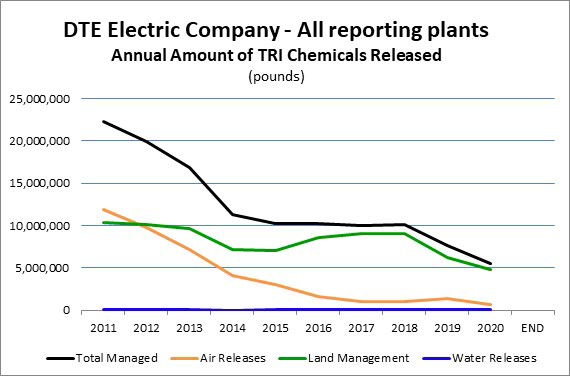Toxics Release Inventory Reporting
What is the TRI Report?
The Toxics Release Inventory (TRI) is a publicly available database of information on the release and transfer of nearly 650 chemicals by private companies and government facilities. Congress created TRI under the Emergency Planning and Community Right-To-Know Act of 1986 (EPCRA) and the United States Environmental Protection Agency (EPA) administers the program. Electric utilities were added to the list of manufacturing industries required to report to the TRI Program in May 1997.
DTE Energy’s TRI Emissions
DTE Energy uses a variety of fuels and energy sources to produce electricity. Five coal-fired power plants produce about 70 percent of the electricity that we supply, with the remainder produced by nuclear power, oil, natural gas, hydro and renewable energy, including wind and solar.
Even with expert operation and sophisticated pollution control equipment, that much coal combustion produces millions of pounds of recycled by-products that are released into the air/water or disposed of in approved containment facilities.
DTE obtains coal from dozens of mines and the coal from each mine has a unique mix of trace elements that are the source for chemicals reported in the TRI data. TRI emissions will vary both year-to-year and from plant-to-plant due to these factors. DTE’s overall TRI emissions have decreased. The graph below illustrates decreasing emissions since 2009.
Based on available studies, DTE is confident its power plant releases are not harmful to employees or the public. DTE commits to operating its power generating stations in compliance with applicable regulatory standards.
View the DTE Energy 2019 TRI Report.
View the DTE Energy 2020 TRI Report.
Additional Information
For more information about Toxic Release Inventory reports, check out these resources from the Edison Electric Institute.
A Primer on Electric Utility Companies and EPA's Toxics Release Inventory
Electric Power Generation and TRI
How Power Plants Are Reducing Air Emissions
Additional Information
DTE continues to work with regulatory agencies in support of Community Right-to-Know activities. If you have questions about chemical emissions and the TRI, please contact DTE Energy's Media Relations Department at 313.235.5555.

